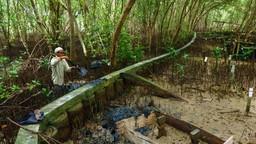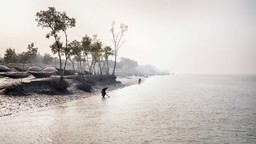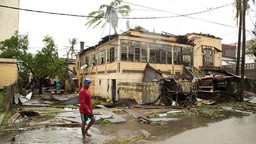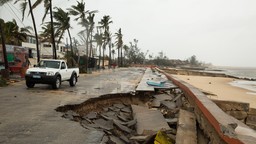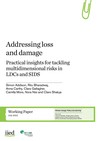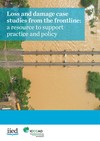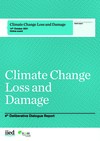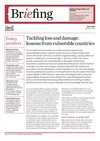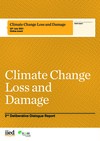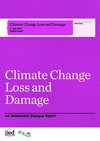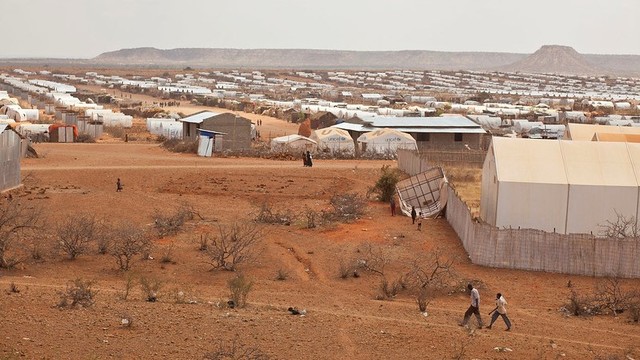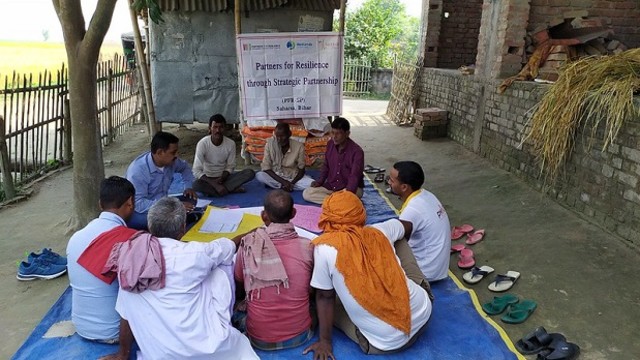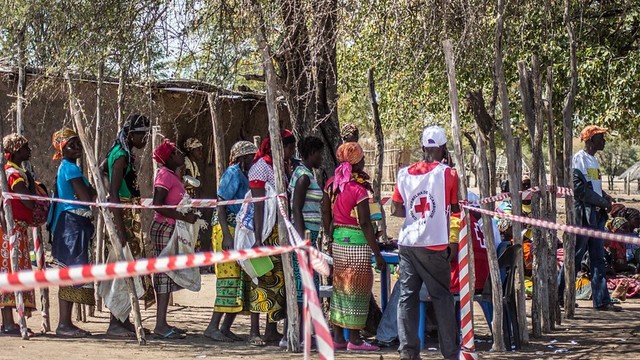Tackling loss and damage in countries vulnerable to the effect of the climate crisis: improving evidence and co-generating pathways to impact
IIED is working with least developed countries, Small Island Developing States and representatives of vulnerable communities to develop a vision for practical action to address loss and damage caused by climate change.
Principal researcher (climate governance and finance team), Climate Change

People wading through the flood waters and carrying their belongings in Mozambique after Cyclone Idai in 2019 (Photo: Denis Onyodi/IFRC/DRK/Climate Visuals, CC BY-NC-ND 4.0)
Loss and damage is one of the most important issues for climate-vulnerable developing countries.
Communities and ecosystems around the developing world are experiencing unprecedented extreme weather events. Driven by climate change, these shocks will worsen with every increment of global heating, exposing billions of people to catastrophic loss and damage – from loss of life, land, homes, income, opportunity and cultural identity to damaged infrastructure, ecosystems, essential services and sustainable development.
Governments of countries vulnerable to loss and damage must prepare, respond and protect their people and ecosystems, but they are hampered by a lack of guidance on how loss and damage should be addressed in practice, who should foot the bill, and a lack of technical support.
The international debate on loss and damage was initiated almost 30 years ago by Small Island Developing States (SIDS) who were concerned by the potential impacts that climate-related sea level rise would have on their environment, communities and economies.
Since then, the issue of loss and damage has given voice to the increasingly urgent concerns of vulnerable countries and communities about the existential risks they face from climate change impacts that may be unavoidable and irreversible, and that may push them beyond their ability to adapt to the changing climate, undermining their efforts to achieve sustainable development.
This initiative aims to address some of the challenges vulnerable countries face in addressing loss and damage.
It aims to shift the narrative on what vulnerable developing countries and communities can do practically to address loss and damage, now and in the future, and what international donors and other stakeholders can do to support vulnerable countries and communities to tackle climate impacts on their own terms.
By fostering dialogue and by leveraging evidence to catalyse policy action, the project hopes to shape a new collective vision for action to address loss and damage.
The objectives of this project are:
- To generate compelling evidence that vulnerable developing countries and communities can use to influence the UNFCCC negotiations and other policy processes
- To create space for vulnerable developing countries and communities to tell their stories about how loss and damage affects them, to communicate their priorities for action, and to share their solutions
- To co-generate a shared narrative and collective vision for action to address loss and damage that is based on evidence of solutions that work for vulnerable people
- To build a coalition of allies who are committed to addressing loss and damage as an urgent priority, and
- To raise the priority of loss and damage as an issue to be addressed in global policy forums and by national governments.
What is IIED doing?
IIED is working with the International Centre for Climate Change and Development (ICCCAD) to:
- Convene a series of multi-stakeholder deliberative dialogues prior to COP26 in which representatives of least developed countries (LDCs) and SIDS, civil society organisations and Southern climate activists, can raise their voices on loss and damage and discuss: where and what type of action and support they need; what works and in which contexts; how such action and support can be delivered; and how it can be financed
- Conduct research on loss and damage, generating evidence on: the contested conceptualisation of loss and damage in the global policy arena; the landscape of loss and damage risks (with a focus on the most vulnerable developing countries and communities); possible solutions to address those risks; and how those solutions can best be financed
- Facilitate Southern actors to generate case studies and create a case study compendium, and
Support the co-creation of a ‘political roadmap’ for action to address loss and damage by 2030 – one that is endorsed by LDCs, SIDS, climate activists, financial institutions and donors.
- This project is also linked to IIED's work to develop tools and approaches for social protection programmes to help communities better absorb the effects of climate risks, adapt to climate impacts and transform their capacities to address growing climate stresses.
News and updates
Publications
Additional resources
Video: Women paying the health cost of the climate crisis (March 2024)
Shock-responsive social protection in fragile and conflict-affected states, Ritu Bharadwaj, N. Karthikeyan (2023), Working paper
Strengthening anticipatory risk response and financing mechanisms for social protection: a practical approach to tackling loss and damage, Ritu Bharadwaj, Tom Mitchell (2022), Working paper
Press release: Multifaceted approach best way for vulnerable countries to overcome climate losses and damage (July 2022)
Press release: Low income countries urgently need finance, technology to address losses and damage due to climate change (October 2021)
Press release: Scotland pledges £6m for climate justice (October 2021)
Video: Tackling climate change in fragile states and protracted crisis situations (October 2021)
Connecting the dots: climate change, migration and social protection, Ritu Bharadwaj, Somnath Hazra, Mohan Reddy, Shouvik Das, Daljeet Kaur (2021), Working paper
Climate-induced migration and modern slavery: a toolkit for policymakers, Ritu Bharadwaj, Danielle Bishop, Somnath Hazra, Enock Pufaa, James Kofi Annan, (2021), Toolkit
Event: Tackling climate change in fragile states and protracted crisis situations
Blog: Humanitarian action is part of climate response – but must be early and locally led, by Anna Carthy and Simon Addison (October 2021)
Podcast: Loss and damage – recognising the costs of climate change: Make Change Happen podcast episode 10 (March 2021)
Animation and blog series: Demanding attention for the loss and damage from climate change (2021)
Event: Loss and damage – research, policy and lived experience in least developed countries (September 2020)
Loss and damage in the Paris Agreement’s global stocktake, Brook M Dambacher, Olivia Serdeczny, Ms Kunzang (2018), IIED Briefing
Donors
Swedish International Development Cooperation Agency (Sida)
CECG – climate emergency collaboration group
